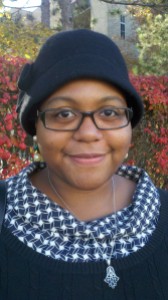Written by Alissa Golbus, Cohort 7 Mikveh Guide at Mayyim Hayyim 
One of the hardest parts of my conversion process was, strangely enough, choosing my Hebrew name. The opportunity to claim a name that encapsulates my understanding of who I am and who I hope to be as a Jew felt so hugely important that I actually lost some sleep over it (people who know me personally will not find that surprising). What I did not know then was that Mayyim Hayyim would ultimately help me establish my Jewish identity before I even entered the waters of the mikveh.
I knew very early on that I would have my beit din and conversion ceremony at Mayyim Hayyim, so I was also on a mission to find out as much as I could about what the big day would be like. My rabbi had done a good job of assuring me that it would be an atmosphere of welcome, and that there was no way for me to fail since he wouldn’t bring me before the beit din before I was ready. Yet since I am at best a worrywart and at worst a control freak—my husband says I am both of those things—I needed to do research. I was excited when I found all of the workshop recordings and conference materials from the 2010 Gathering the Waters conference on Mayyim Hayyim’s website, including five workshops on conversion.
I was listening to the workshop called “’The Wet Hair Moment:’ Welcome Rituals of Song, Prayer, and Community” when it all came together. Included in that workshop’s materials is the following quotation:
“It seems simple, the Hebrew word for water. But the Hebrew letter mem at the beginning of mayyim is different from the mem at the end. And so it is when you pass through the water. You begin in one shape and you emerge, still yourself, but changed,” from “Mayyim” by Pam McArthur, The Mikveh Monologues.
During the workshop several of the participants explored that concept in more depth, seeing how the word mayyim contains within it a beautiful metaphor for the conversion process: the mem passes through Shem Hashem (the name of God) and emerges, having both changed and maintained its essential self. The moment I heard this, I knew it was bashert (destiny): I had found the name I wanted to call myself. A week before my conversion I added a second name—Shalvah—in honor of a loved one who had just died, which makes me Mayyim Shalvah bat Avraham v’Sarah – Tranquil Waters, daughter of Abraham and Sarah. I have a new name, and a new Jewish identity, but I am also still myself.
Alissa Golbus a member of the seventh cohort of mikveh guides at Mayyim Hayyim and a student at the University of Massachusetts Boston.

